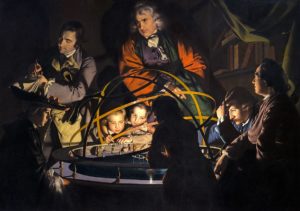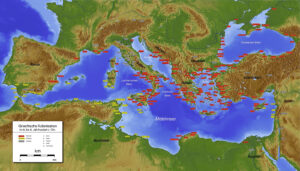 The New Greek Way
The New Greek Way
As the Greeks emerged from their reorganizing period, in the eighth century BC (800-701 BC), we can see that they were living quite differently from the way they had prior to 1,200 BC. One good example is this: The palaces of the Mycenaean kings were not turned into palaces for new kings. Rather, people turned them into temple complexes.
As we mentioned in Lesson 4, the stories of the Greeks made them believe that they could be clever, even able to outsmart gods. And so they began reorganizing themselves as primaries, rather than secondaries… assuming that they should hold power over themselves, rather than living as others ordered.
The stories didn’t fix everything, of course – large problems remained – but they were enough to create a model of life in which Greeks thought freely and acted freely, at least mostly. As a result, they created and did a great deal… certainly far more than the people of the old empires did.
We see this very clearly in the way Greeks went around the world creating new colonies. As you can see from the red rectangles on map below, they spread all over the Mediterranean area. (The yellow rectangles represent Phoenician colonies.)

One reason the Greeks did this was because they had so little good land. With so little ability to grow food, people went looking for land elsewhere. But more than that, the Greeks believed they had found a great way to live and went out to live it. They believed that their way was better, that it deserved to spread, and that they were rising beyond what had come before.
This is not to say that the Greek way was excellent all-around. The Greeks, in fact, carried a lot of poor ideas as well. The two largest ones were slavery (as we discussed in Lesson 4) and the idea that dominating others was good and heroic.
Between their history of dominating rulers and myths with powerful, violent heroes, Greeks accepted the concept that dominating others was, if not good, at least unavoidable, because that was “the way the world works.” And so the Greek city-states fought their neighbors incessantly, often every year. Colonists didn’t usually go out to conquer, but if there were some people in their way, they didn’t hesitate to remove them, often violently.
But while the Greeks were dominance-minded, they did so mostly as individuals. That is, each land-owner considered himself an independent entity and didn’t spend time and effort supporting a ruler. And they certainly wouldn’t have been awed by one. As a result, whatever kings did exist in Greece (and again, each city was different), they were far less powerful than the rulers of the ancient era, and may not have been much of a ruler at all. In fact, during the earlier parts of the classical age, a ruler might be chosen from among the land-holders for a period of time and would return to being a simple land-owner.
The Greeks, again because of the dominance mindset, were less than ideal in treating women. Wives were expected to stay inside their homes: to venture out seldom, and always accompanied by her husband or some other related man. One of the 150 axioms inscribed of the temple of Apollo at Athens, was Rule your wife. This type of public rule, however, was sometimes ignored, and very frequently inside the home.
Regardless of public laws, the life shared by a man and a women inside their home has been fairly consistent through history. Couples find their own levels of cooperation and affection. We know from the inscriptions on ancient grave markers that there were Greek men who loved and respected their wives, and who grieved deeply when they died.
**
Paul Rosenberg
freemansperspective.com
